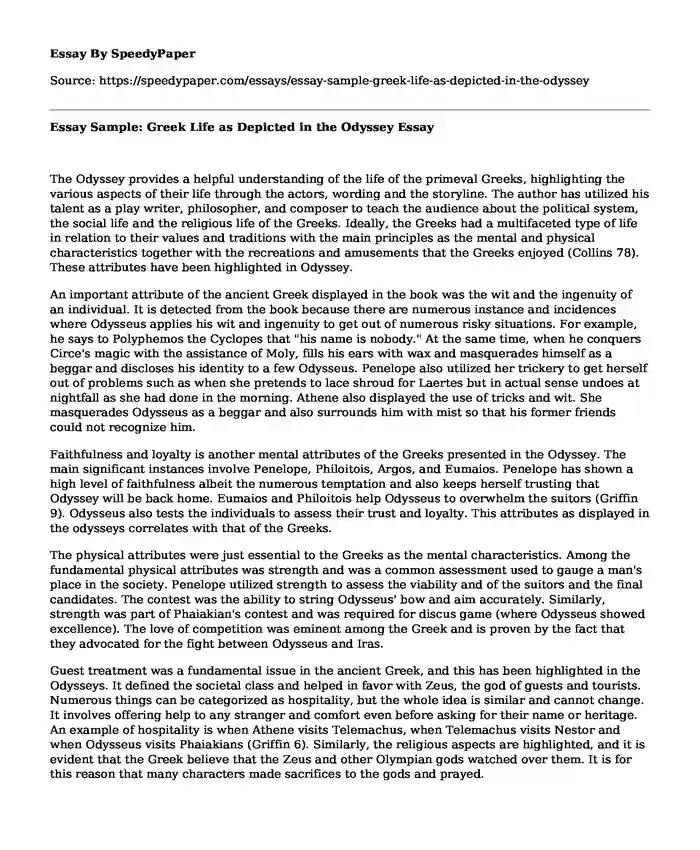
| Type of paper: | Essay |
| Categories: | Literature Odyssey Homer |
| Pages: | 3 |
| Wordcount: | 664 words |
The Odyssey provides a helpful understanding of the life of the primeval Greeks, highlighting the various aspects of their life through the actors, wording and the storyline. The author has utilized his talent as a play writer, philosopher, and composer to teach the audience about the political system, the social life and the religious life of the Greeks. Ideally, the Greeks had a multifaceted type of life in relation to their values and traditions with the main principles as the mental and physical characteristics together with the recreations and amusements that the Greeks enjoyed (Collins 78). These attributes have been highlighted in Odyssey.
An important attribute of the ancient Greek displayed in the book was the wit and the ingenuity of an individual. It is detected from the book because there are numerous instance and incidences where Odysseus applies his wit and ingenuity to get out of numerous risky situations. For example, he says to Polyphemos the Cyclopes that "his name is nobody." At the same time, when he conquers Circe's magic with the assistance of Moly, fills his ears with wax and masquerades himself as a beggar and discloses his identity to a few Odysseus. Penelope also utilized her trickery to get herself out of problems such as when she pretends to lace shroud for Laertes but in actual sense undoes at nightfall as she had done in the morning. Athene also displayed the use of tricks and wit. She masquerades Odysseus as a beggar and also surrounds him with mist so that his former friends could not recognize him.
Faithfulness and loyalty is another mental attributes of the Greeks presented in the Odyssey. The main significant instances involve Penelope, Philoitois, Argos, and Eumaios. Penelope has shown a high level of faithfulness albeit the numerous temptation and also keeps herself trusting that Odyssey will be back home. Eumaios and Philoitois help Odysseus to overwhelm the suitors (Griffin 9). Odysseus also tests the individuals to assess their trust and loyalty. This attributes as displayed in the odysseys correlates with that of the Greeks.
The physical attributes were just essential to the Greeks as the mental characteristics. Among the fundamental physical attributes was strength and was a common assessment used to gauge a man's place in the society. Penelope utilized strength to assess the viability and of the suitors and the final candidates. The contest was the ability to string Odysseus' bow and aim accurately. Similarly, strength was part of Phaiakian's contest and was required for discus game (where Odysseus showed excellence). The love of competition was eminent among the Greek and is proven by the fact that they advocated for the fight between Odysseus and Iras.
Guest treatment was a fundamental issue in the ancient Greek, and this has been highlighted in the Odysseys. It defined the societal class and helped in favor with Zeus, the god of guests and tourists. Numerous things can be categorized as hospitality, but the whole idea is similar and cannot change. It involves offering help to any stranger and comfort even before asking for their name or heritage. An example of hospitality is when Athene visits Telemachus, when Telemachus visits Nestor and when Odysseus visits Phaiakians (Griffin 6). Similarly, the religious aspects are highlighted, and it is evident that the Greek believe that the Zeus and other Olympian gods watched over them. It is for this reason that many characters made sacrifices to the gods and prayed.
In conclusion, the Greek values and beliefs are continually shaped by the author's narration. The epic has allowed the current generation to know the times when people fought with their hands, when gods conquered cultures and when faithfulness and affection were important. This is indeed a great narration that has not only captured the various aspects of the ancient Greek and culture but has also told a story that can be narrated between generations.
Works Cited
Collins, William Lucas. Homer: The Odyssey. Blackwood, 1870.
Griffin, Jasper. Homer: The Odyssey. Cambridge: Cambridge University Press, 2004. Print.
Cite this page
Essay Sample: Greek Life as Depicted in the Odyssey. (2022, Jun 28). Retrieved from https://speedypaper.net/essays/essay-sample-greek-life-as-depicted-in-the-odyssey
Request Removal
If you are the original author of this essay and no longer wish to have it published on the SpeedyPaper website, please click below to request its removal:
- Fast Food Essay Example
- Essay Sample with the Poem Analysis
- Religion Essay Sample: The Similarities and Differences between the Sunni and Shiite Muslims
- Has the Equality of the Sexes Created a Better Society? Our Free Essay Answers
- Essay Example on Cars Should Not Be Banned From the City Centers
- Paper Example. Data Analyzing
- Essay Example on William Steward and Bustill Mossell Biography
Popular categories




